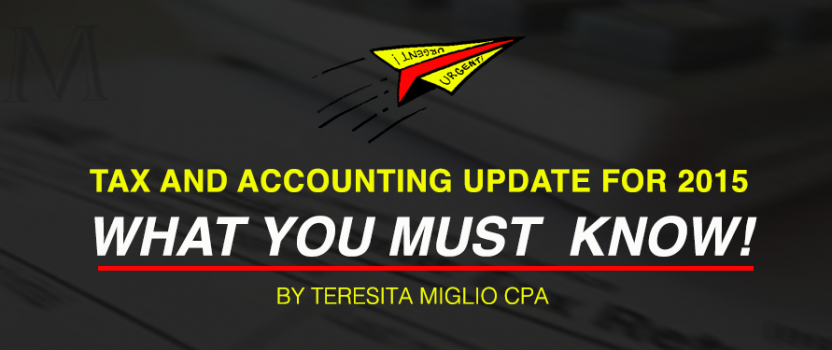TAX AND ACCOUNTING LAST UPDATE FOR 2015, WHAT YOU MUST KNOW!
TAX AND ACCOUNTING LAST UPDATE FOR 2015, WHAT YOU MUST KNOW!
I was at one of my continuing education seminars yesterday. It is becoming increasingly clear that our government and those of the rest of the world are becoming much more intrusive and creative trying to get more money in their coffers. This, in turn, creates new rules and new regulations, which, for the most part, are not communicated to those that need to know.
Among the topics discussed and which can financially impact taxpayers is the recent legislation and rulings on offshore voluntary disclosures of foreign bank accounts. The penalties are quite stiff if you do not voluntarily report any offshore accounts, whether in the taxpayer’s name or accounts where the taxpayer has signature. And now there is an extensive list of court cases piling up which are giving the IRS even more ammunition to collect these outrageously high penalties, which, if the taxpayer is found to not have disclosed these offshore accounts with intent, can mount up to several times over the actual amount of money in the bank account (50% per year) or if not intentional, the penalty is only $10,000. Also, Form 114 (FBAR) must be filed electronically, or a $500 penalty will be imposed on the taxpayer if it is filed by any other method. There is also now a new due date for the form. It is April 15th. But you can file for a 6 month-automatic extension to file.
Then there are the final regulations on the estate tax portability election the surviving spouse must make, on a timely filed estate tax return, for the first deceased spouse, in order for her to make full use of any remaining estate tax exclusion of the deceased spouse. (Reg. 301.9000-3). And, if you want a ‘closing letter’ from the IRS, you can no longer request it when you file Form 706 (Estate Tax Return). You must now wait four months and then request it. Executors of estates, you must be careful before distributing the assets to the beneficiaries. It the decedent owed income taxes for unfiled income tax returns, then you will be personally liable if you disburse the funds and are not able to pay the estate’s income tax liability. So, to avoid this problem, ask the IRS to audit the return for any unfiled income tax returns of the decedent before making the disbursements. Once the IRS responds that not income taxes are due, then you are in the clear.
Another hot topic is the new Statements on Standards for Accounting and Review Services: Clarification and Re-codification (SSARS N. 21). (That is a mouthful). In essence, we CPAs now have new rules regarding general principles for engagements performed in accordance with Statements on Standards for Accounting and Review Services (Section 60), Preparation of financial statements (Section 70), Compilation engagements (Section 80), and Review of Financial Statements (Section 90). So, for you CPAs, read up on this. This takes effect on December 15, 2015.
Another lovely topic was the new regulations on Tangible Property Repair that actually took effect on January 1, 2014. (T.D. 9636). This has to do with new rules on capitalizing or expensing of costs to acquire tangible property and what constitutes improvements versus repairs. (IRS Code Sections 162, 163) (Rev. Proc. 2015-20). I am not even going to get into this. I personally think that Congress and the IRS seem to not have anything better to do than think of ways to complicate our lives.
Have a very Happy Thanksgiving!





Most Commented Posts